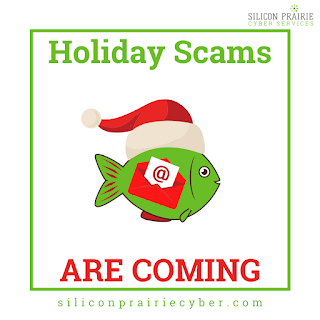Black Friday and Cyber Monday Secure Shopping Tips
Have you seen the Black Friday and Cyber Monday ads that started Nov 1st? The black Friday shopping that started Nov 4th? Clearly, businesses want you to spend your money shopping with them. And that means cyber criminals are just a few steps behind, and ready to snag your cash instead.
In order to help you keep your money safe and receive the gifts you want this holiday season, I’m sharing…
10 TIPS FOR A SAFE AND SECURE HOLIDAY SHOPPING SEASON
1. Turn on MULTI-FACTOR AUTHENTICATION
Add that extra layer of security to all of your accounts by adding an extra step to your login-procedure. This is a code you enter after you submit your username and password. The code can arrive via an app (such as Google Authenticator), text, or email. It may also called to as dual-factor or two-factor and is abbreviated as MFA or 2FA. Enable it everywhere possible -especially on password keepers, email, and financial accounts.
2. Avoid FREE WIFI
That FREE WiFi you're using might cost you more than you think. Many are unsecure, don't encrypt their data, or are easily hacked. Think twice before logging into accounts and entering personal data on that free WiFi.
3. There’s no such thing as a free lunch or A FREE GIFT CARD
As the holiday season approaches, there will be a surge in offers to give you free gift cards to enjoy the holiday season. Rest assured… Costco, Walmart, Macy's, and other popular retailers are not giving away coupons for a mega percentage off, nor are they giving you a $250 off coupon to help you enjoy the holidays. Watch out for ads that appear to be from a popular retailer offering a HUGE discount. All the scammer wants you to do to claim the "coupon" is answer a few quick questions. The coupon or gift card is, of course, fake and it was only a ruse to steal your info!
4. Beware of the HOLIDAY PHISH
That holiday phishing email often contains a coupon or other special online shopping offer. Other popular holiday phishing lures include bogus gift card offers, giveaways, contests, and too-good-to-be-true deals. These scams will try to create a sense of urgency by using the phrase 'act now' or displaying super short time limits on the deals.
5. The gift that was SUPER CRAPPY or NEVER WAS
Keep your eyes peeled for the many clickbait ads promoting sought-after products or the impossible to score gift. Unfortunately, some of these ads are from fraudsters, posing as merchants who want to steal your passwords or give you the gift of malware. Some merchants will disappear without a trace, while others will send you an inexpensive, ineffective product for the same reason (AKA the crappy gift). Don't be a victim of the gift that never was. Don't click on the link in the email, avoid the online ad clickbait, shop with retailers you know, and read reviews.
6. Don’t pay for Fraud USE CREDIT CARDS
The Fair Credit Billing Act makes it so consumers are only liable for up to $50 in fraudulent charges. Major credit card companies have "zero liability" policies, so you don't have to pay for any fraud. Using Apple Pay, Google Pay, or PayPal accounts linked to credit cards are also a secure way to shop, as the vendors never receive your credit card number.
7. Watch for BOGUS and UNSECURE WEBSITES
Not all websites are created equal. Reputable websites will display HTTPS and a padlock in the address bar. Depending on your browser, it might take an extra click in the address bar to see it. If it’s not secure… RUN… don’t enter any payment information. Also watch out for websites that are just a typo away from the real thing. Always check the spelling twice after typing in an address or before clicking on a link to ensure you end up where you want, and not a scammers' site.
8. AVOID POP-UPS AND ADS
Did you know the information and links in pop-ups and ads aren’t verified nor checked for malicious content? This makes pop-ups and ads the perfect hunting grounds for scammers to steal your information and money. If you see an amazing deal or coupon in an ad or pop-up, DON’T CLICK. Better yet, don’t see them at all - install a pop-up blocker. Most anti virus programs come with one or you can select an extension to use within your browser.
9. BOGUS CHARITIES
Keep your eyes peeled for charity scams this holiday season. These scams trick you into believing you're donating money to a charity and for a good cause. Reality check! The fraudsters are luring you in to donate money to them - the bad guys. First, legitimate charities are registered, and you can look up their details at Give.org or CharityWatch.org before donating. Second, avoid replying to strangers or organizations who ask for money upfront via email. Third, visit the charity's website directly to donate, and double-check the spelling!
10. SISTER GIFT EXCHANGE SCAMS
Facebook keeps this scam alive, and posts promise participants 36 gifts in exchange for sending one. A newer and slightly modified version of this scam pops up each year and can revolve around exchanging bottles of wine or purchasing $10 gifts online. You might see references to receiving "happy mail" or doing it "for the good of the sisterhood." Don’t be fooled. You won’t be getting 36 gifts.
Love these tips? Download them now!
Want more? Check out this video on Instagram where I share more about spotting holiday scams and bogus charities during holiday season.





Comments
Post a Comment